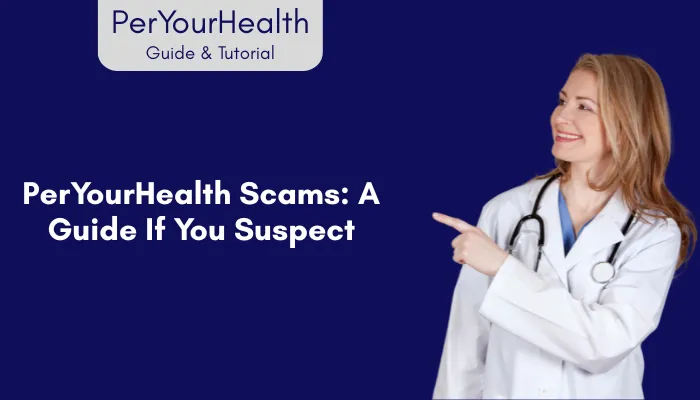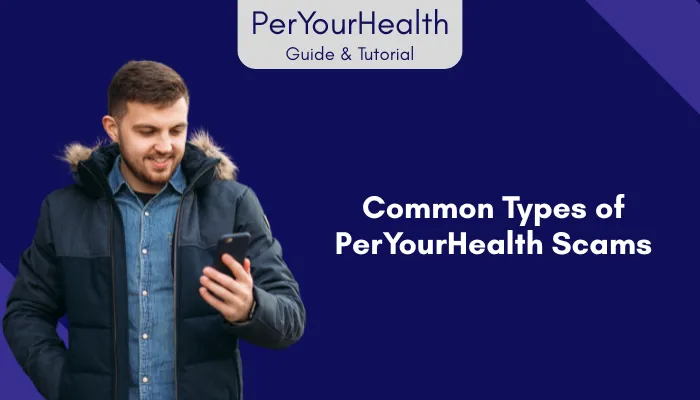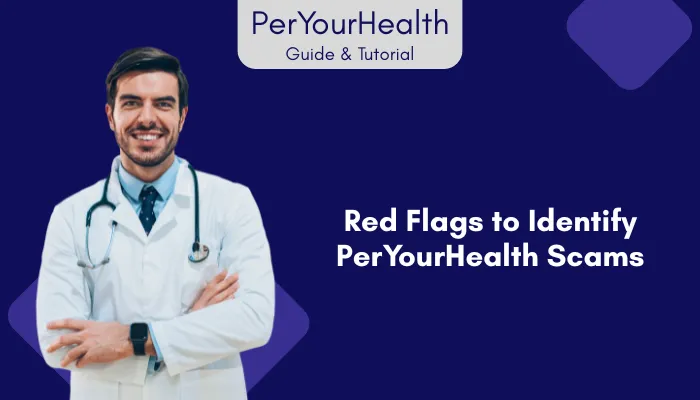Have you heard PerYourHealth scam alerts or Got a shady email or call demanding payment for medical billing platform services? Whether you’re trying to access your account through the PerYourHealth login or manage your medical bills, always be cautious.

Don’t fall for it! In this guide, we’re diving into scam awareness, exposing tricks like phishing, fake websites, and fraudulent calls that impersonate legitimate services.
Empower you with vigilance to ensure personal information protection, financial security, and safe interaction with PerYourHealth and healthcare services. Let’s get started!

PerYourHealth Scams: A Guide If You Suspect
Let’s say you just got a weird email saying you owe money to PerYourHealth, and it’s asking for your bank details—with a sketchy link thrown in for good measure. If your spidey senses are tingling, good. That means you’re alert. Acting fast and smart can save you from a headache, or worse, identity theft.
Immediate Actions
First things first: panic helps nobody.
Here’s what you need to do right now:
- Do not click links in the suspicious message. I know, that “Pay Now” button is glowing like it wants to be touched—but don’t.
- Do not share information. Not your name, not your Social Security number, not even your favorite pizza topping.
- Do not make payments under pressure. Real billing services don’t threaten to “send the cops” in 30 minutes if you don’t pay.
Take the precautions and save yourself from PerYourHealth scams.
Reporting to PerYourHealth
If you suspect something fishy, let the real PerYourHealth support team know. They’re the ones who can investigate further and even stop wider scam attempts.
here are the methods for Reporting Suspicious Activity:
| Method | Details |
|---|---|
| Official Website | Go to www.peryourhealth.com and use their contact form. |
| Email (if available) | Only use emails listed on their official site. No nonsense. |
| Phone Contact | Use the official phone number from a billing statement or healthcare provider. |
Make sure to report suspicious activity with all the juicy details—screenshots, email addresses, suspicious URLs. It helps them help you (and others).
Contacting Your Healthcare Provider
You’d be surprised how often these scams involve fake references to real doctors or clinics.
Call your healthcare provider directly (you know, the number printed on your actual bill or appointment card). Ask:
- “Did you send me a payment request via PerYourHealth or MyMedicalMe ?”
- “Has there been any suspicious billing activity on my account?”
They can confirm whether the charge is PerYourHealth legit and help you take next steps if it’s not.
Filing a Complaint with Authorities
I’m going to be blunt here—ignoring a scam won’t make it go away. If someone tried to rob you in person, you’d call the cops, right? This is no different.
Where to File a Complaint:
To file a complain you can file it in:
- Federal Trade Commission (FTC): www.reportfraud.ftc.gov
- Local Law Enforcement: Especially if you’ve lost money or shared personal data.
- State Consumer Protection Office: They often handle scam reports, too.
Be detailed. Use dates, amounts, screenshots, and copies of any communication. This isn’t busywork—these reports help crack down on real cybercriminals.
Monitoring Your Accounts
Even if you didn’t fall for the scam, it’s smart to monitor bank accounts and credit reports—just in case.
Here’s what you can do to monitor your accounts:
- Set up transaction alerts with your bank.
- Use free credit report tools like AnnualCreditReport.com to check for weird activity.
- Review statements weekly (pro tip: make it part of your Friday wind-down—you’ll feel super responsible).
If something looks off, report it immediately.
Scanning for Malware
If you clicked a link (hey, it happens), don’t beat yourself up. But do scan your device immediately for malware. Scammers love sneaking spyware onto your phone or computer to grab login credentials later.
Tools :
here are the tools which can be use to protect your operating system from the viruses:
| Platform | Recommended Tool |
|---|---|
| Windows | Malwarebytes, Windows Defender |
| Mac | CleanMyMac, Norton 360 |
| Mobile (iOS/Android) | Lookout, Avast, Norton Mobile |
Make sure your antivirus is up to date and do a full system scan, not just a quick one.
Look, we all make mistakes—or just get unlucky. But knowing what to do if you suspect a scam makes all the difference. From avoiding that “do not click links” trap to scanning for malware, every action you take protects your financial security and personal information.

Common Types of PerYourHealth Scams
I’ve seen my fair share of scams, and let me tell you, the ones targeting PerYourHealth users are sneaky. I’ll walk you through the most common scam tactics so you can spot them a mile away and keep using the PerYourHealth platform like a pro.
Phishing Emails:
Phishing emails are the oldest trick in the book, and scammers love them. A few years ago, I got an email claiming I owed $500 for a hospital visit I didn’t make. It looked legit—until I spotted the shady email address.
Here’s what to watch for PerYourHealth scams phishing emails:
- Fake invoices claiming you owe money for services you don’t recognize.
- Attempts at login credentials theft by urging you to “verify your account” via a dodgy link.
- Urgent tones screaming, “Pay now or else!” (1000% WRONG approach for legit companies.)
Cool tip: Always log in directly on the official website (peryourhealth.com) to check your balance. Never click email links, and you’ll stay safe.
Now that you know what a phishing email looks like, can you spot one in your inbox? Keep practicing safe clicks and question anything that smells fishy—your digital wallet will thank you.
Fraudulent Websites:
Fraudulent websites are like bad movie sequels—they look similar but ruin everything. I once clicked a Google ad for PerYourHealth, thinking it was the real deal. Spoiler: It was a clone site, and my antivirus went wild.
These sites aim for personal information theft by mimicking the PerYourHealth platform. Red flags include:
- Slightly off URLs (e.g., peryourhealthh.com—notice the extra “h”).
- Poor design or missing features like secure payment options.
- Forms asking for your Social Security number.
Bookmark the official website to dodge these fakes and enjoy seamless PerYourHealth online payment system.
Think you can tell a real site from a fake one? Try checking the URL next time you visit—one letter can make all the difference in keeping your info safe.
Phone Scams:
Phone scams are personal favorites of scammers because they sound so convincing. I got a call once from “PerYourHealth” demanding immediate payment. Worked well… for a while, until I asked for their official number—poof, they hung up! Watch out for:
Avoid PerYourHealth scams like a pro by dodging phone scams like:
- Payment demands over the phone without verifiable proof.
- Callers refusing to provide healthcare provider details.
- Threats like “We’ll report you to collections!” (So not how legit billing works.)
Verify any call by contacting your healthcare provider directly. Use PerYourHealth’s patient portal to confirm bills securely.
Text Message Scams:
Text message scams are the new kids on the block, and they’re bold. I got a text last month with a link to “pay my bill.” Clicked it (on a test device, relax!), and it led to a sketchy site.
These text messages scam often include:
- Malicious links that install malware or steal data.
- Fake alerts about “urgent billing issues” tied to PerYourHealth.
- Random numbers not linked to official contacts.
Pro move: Block the number and check your account via the official website. This keeps your user experience smooth and secure.
By sticking to the official website, secure login portals, and verified healthcare provider contacts, you’ll master the PerYourHealth platform and keep scammers at bay.
Phew, that’s the scam lineup! Knowing these tricks equips you to use PerYourHealth confidently, keeping your online bill payment and patient portal experience scam-free. Stay sharp, and let’s dive into spotting those red flags next!

Red Flags to Identify PerYourHealth Scams
Let’s be real—online fraud is everywhere, and scammers prey on user vulnerability. That’s why I’m here to show you the red flags I personally watch for when checking if something claiming to be from PerYourHealth is legit—or a scam in disguise.
Unsolicited Communications
If you didn’t ask for it, question it. I can’t stress this enough.
Unsolicited communication is often the first trap. You might get an email, text, or even a call claiming there’s an “urgent” issue with your medical bill. If you’ve never even used the PerYourHealth platform recently, that’s your cue to get suspicious.
Examples:
- A text from a random number claiming “Your payment at PerYourHealth is overdue. Click here.”
- An email demanding immediate login, even though you haven’t had a recent hospital visit.
Pro Tip: Always go to peryourhealth.com yourself—don’t click a link someone else sent.
Real medical billing doesn’t come knocking unless you’ve got an appointment history to back it up. Trust your gut—and your records—before clicking anything and be safe from PerYourHealth scams.
Poor Language and Grammar
This one makes me laugh—and cry. You know those messages that read like someone used Google Translate on three different continents?
Misspellings, awkward phrases, and flat-out unprofessional language are like a neon sign saying “SCAM ALERT.”
Yeah… 1000% WRONG. A legit medical billing platform will sound professional—think corporate, not kindergarten.
A real medical billing platform like PerYourHealth uses professional language. The moment it reads like a spam bot? Walk away.
Suspicious Requests for Information
Scammers love asking for the big stuff upfront: Social Security numbers, bank details, or login credentials. (You know, all the stuff they really shouldn’t be asking via text or email.)
Let me be crystal clear: PerYourHealth will never request sensitive data like that through random emails or texts. If you’re seeing that kind of demand, you’re not dealing with a trusted source.
Red Flag Checklist:
- Are they asking for bank details or SSN via email?
- Do they need your account password “to verify” something?
- Are they pressuring you to enter data “now or face consequences”?
If yes, it’s a solid no from me.
Legit services won’t ask for sensitive info like SSNs or full bank credentials through email or text. PerYourHealth uses secure login—not phishing bait.
Urgent or Threatening Language
Here’s a line I heard once: “Act now, or your credit will be affected.”
Excuse me? That’s a pressure tactic, and it’s a favorite of scammers.
They want you scared and rushed, so you don’t think before clicking. Threatening language is NOT how legitimate services communicate. If someone’s trying to scare you into a payment, take a breath—and then walk away.
Following are the Common Phrases to Watch For:
- “Final notice—pay now or legal action will be taken.”
- “Your health record is locked. Unlock with immediate payment.”
- “Your insurance will be cancelled if you don’t respond today.”
Sound familiar? Yeah. Me too. I delete them on sight.
Scare tactics are the scammer’s favorite trick. Real medical billing providers use due process—not digital ultimatums.
Suspicious URLs and Email Domains
This one’s a favorite of scammers because it looks real at first glance. They’ll send links like:
- PerYourHealth-billing.com
- securepay-peryourheallth.net (yes, that typo is intentional)
URL discrepancies are a HUGE warning sign. If it doesn’t end in PerYourHealth.com, don’t touch it. Same goes for sketchy email domains.
here are the difference between the legit site and a suspicious site:
| Legit | Suspicious |
|---|---|
| [email protected] | [email protected] |
| www.peryourhealth.com | www.pay-PerYourHealthlogin.net |
Keep your eyes sharp. One extra letter or weird domain can mean trouble.
Always triple-check links and sender addresses. A slight change in domain name (like “.org” instead of “.com”) is a classic con move.
Lack of Verifiable Contact Information
Here’s a quick test: Try calling them back. Can’t find a number? Only get a generic “Contact Us” with no details? Yep—that’s a scam.
Legitimate communication will always include verifiable contact information, like a recognizable phone number or address. If it feels sketchy or anonymous, that’s your sign to walk away.
Scammers are vague for a reason. If a company can’t give you a phone number or address, that’s not someone you should be paying.
Discrepancies in Provider Affiliation
Scammers sometimes throw around fake healthcare provider names—ones that sound vaguely familiar or downright made-up. Double-check that the provider mentioned is your actual clinic or hospital.
If you see billing from “Global National Health Systems Inc.” but you only ever visited “St. Mary’s Urgent Care,” something’s not right.
What to Do:
here are the things you can do prevent from PerYourHealth scams:
- Cross-check the provider name with your medical records.
- Call your clinic to confirm if they use PerYourHealth for billing.
If you don’t recognize the provider listed, don’t blindly pay. Always cross-check with your actual medical provider to see if they use PerYourHealth.
So, if you spot any of these PerYourHealth scam indicators, don’t panic—but don’t engage either. Being aware of these warning signs keeps your personal information and financial security safe. I always say: “If it feels off, it probably is.”
Knowing what to look for turns you from a potential victim into a savvy scam-spotter. And trust me, scammers hate that. Stay sharp, stay skeptical, and always go straight to the source: PerYourHealth.com.
FAQ’S for PerYourHealth Scams
Got questions about PerYourHealth scams or security? This FAQ section answers the most common concerns, helping you identify scams, protect your data, and use the platform safely and confidently.
How can I tell if a PerYourHealth email is a scam?
To check whether PerYourHealth email is scam you can go through for red flags like poor grammar, urgent payment demands, or suspicious sender addresses (e.g., “[email protected]”). Always verify by logging into your account directly at the official website—never click email links.
What should I do if I clicked a link in a suspicious PerYourHealth message?
If you accidentally clicked a suspicious link in PerYourHealth message than, scan your device for malware using tools like Malwarebytes or Windows Defender. Change your PerYourHealth password immediately and monitor bank accounts for unauthorized activity. Report the scam to PerYourHealth’s official support team.
How do I report a PerYourHealth scam?
To report scams or fraud, contact PerYourHealth through their official website or phone number (from a verified bill or statement). Include screenshots, sender details, and URLs. Also file complaints with the FTC (reportfraud.ftc.gov) to help stop scammers.
Why is a fake PerYourHealth site dangerous?
Fake PerYourHealth websites are dangerous as it steal login credentials or install malware. Watch for slight URL changes (e.g., “peryourheallth.com”) and always bookmark the real site. Legit billing portals never ask for sensitive data like SSNs via email or pop-ups.
What’s the safest way to pay PerYourHealth bills?
The safest way to pay PerYourHealth bills is pay through the official PerYourHealth portal (peryourhealth.com) or your healthcare provider’s verified payment system. Avoid links in texts/emails, and enable transaction alerts for extra security.
Still uncertain? Refer back here anytime for clear, reliable answers about PerYourHealth security. Stay informed, vigilant, and always use official channels to protect your personal and financial information.
Conclusion
PerYourHealth scam got you worried? We’ve covered spotting red flags, dodging phishing, and verifying communication to keep your personal information protection tight. Stay cautious, use official channels, and contact support if something feels off.
Share awareness with friends, stay informed with scam prevention resources, and take proactive measures to avoid online fraud. Your data security matters! Keep this vigilance reminder handy, protect your data, and boost fraud awareness for online safety.
